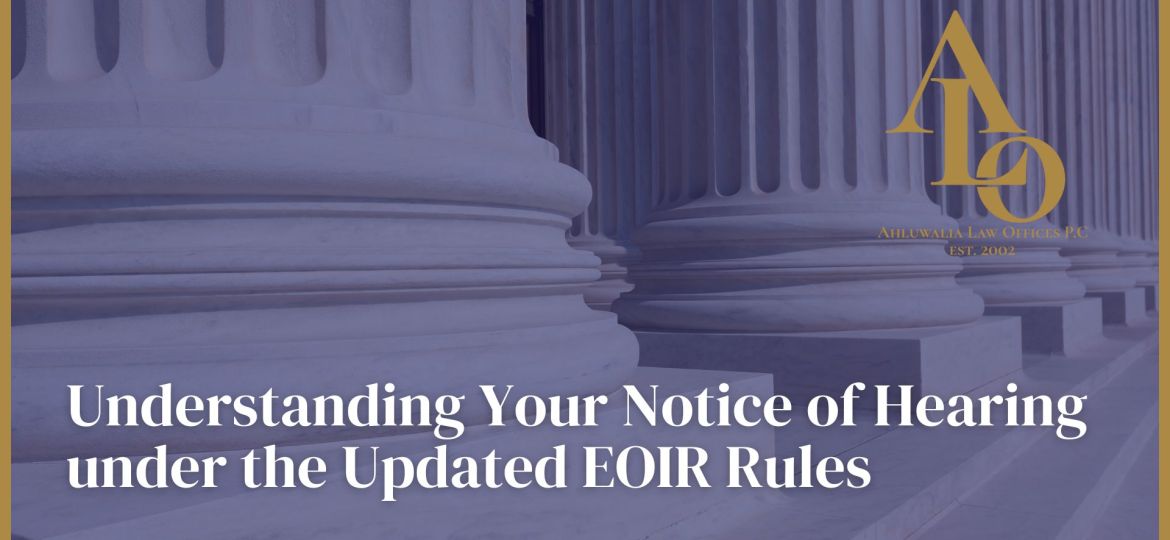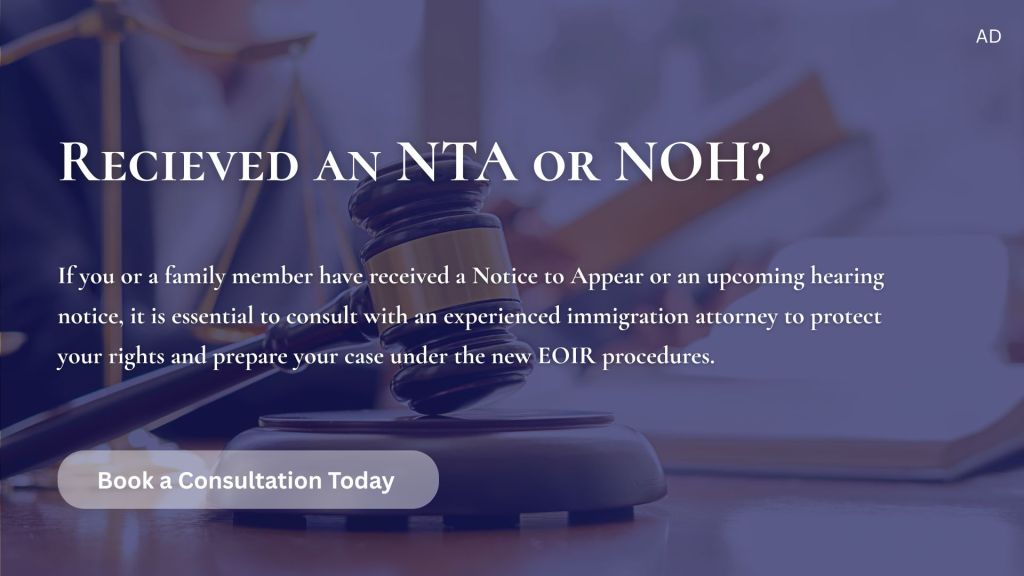
On September 12, 2025, the Executive Office for Immigration Review (EOIR) issued two important policy memoranda that reshape how immigration hearings are noticed and how immigration courts are evaluated. These changes are designed to ensure fairness, reduce backlogs, and improve the efficiency of proceedings in line with federal law and executive priorities.
Notice of Hearings: Updated Procedures
EOIR has replaced its longstanding 1997 policies on hearing notifications with updated requirements for Notices of Hearing (NOH). Key provisions include:
- 10-Day Rule for Initial Hearings: Initial hearings in removal proceedings may not be scheduled earlier than 10 days after service of a Notice to Appear (NTA), unless the individual waives this period. This ensures time to secure counsel.
- Service of Notices: NOHs should be served in person whenever practicable. If that is not possible, they may be mailed to the last address on record. Proof of mailing to the address provided is legally sufficient.
- Obligation to Update Address: Non-detained individuals must notify the Immigration Court of any address changes within 5 days using Form EOIR-33. Failure to comply may result in no further notices being required.
- Detained Individuals: For those in custody, NOHs must also be addressed “in care of” the facility administrator, with sufficient lead time for logistical arrangements.
These rules are critical because failure to appear after proper notice can lead to an in absentia removal order under 8 U.S.C. § 1229a(b)(5).
Immigration Court Priorities and Performance Measures
A companion memorandum sets new priorities and measurable standards for immigration courts. Highlights include:
- Case Prioritization:
- Detained cases and those with statutory or court-ordered deadlines remain top priorities.
- Dedicated Docket cases and expedited asylum reviews must be resolved within strict deadlines.
- Court Performance Metrics:
- 95% of detained removal cases must be completed within 60 days.
- 95% of non-detained removal cases must be completed within one year.
- 95% of motions must be adjudicated within 30 days.
- Custody redetermination requests must be resolved within 5 days.
- Credible fear reviews must be completed within 7 days, and reasonable fear reviews within 10 days.
- Merits Hearings: 95% of cases should conclude on the initially scheduled merits hearing date.
- Accuracy Requirement: 100% of all records must be accurate and complete.
These measures reflect EOIR’s commitment to restoring efficiency and integrity in immigration adjudications while safeguarding due process rights.
What This Means for Immigrants and Families
For individuals navigating immigration proceedings, these updates underscore the importance of:
- Keeping contact information current with the Immigration Court.
- Attending all scheduled hearings promptly.
- Seeking qualified legal counsel to prepare for faster case timelines.
Immigration courts will now be under closer scrutiny to resolve cases efficiently, but individuals still retain their rights to due process and fair hearings.
On September 12, 2025, the Executive Office for Immigration Review (EOIR) issued two important policy memoranda that reshape how immigration hearings are noticed and how immigration courts are evaluated. These changes are designed to ensure fairness, reduce backlogs, and improve the efficiency of proceedings in line with federal law and executive priorities.
Notice of Hearings: Updated Procedures
EOIR has replaced its longstanding 1997 policies on hearing notifications with updated requirements for Notices of Hearing (NOH). Key provisions include:
- 10-Day Rule for Initial Hearings: Initial hearings in removal proceedings may not be scheduled earlier than 10 days after service of a Notice to Appear (NTA), unless the individual waives this period. This ensures time to secure counsel.
- Service of Notices: NOHs should be served in person whenever practicable. If that is not possible, they may be mailed to the last address on record. Proof of mailing to the address provided is legally sufficient.
- Obligation to Update Address: Non-detained individuals must notify the Immigration Court of any address changes within 5 days using Form EOIR-33. Failure to comply may result in no further notices being required.
- Detained Individuals: For those in custody, NOHs must also be addressed “in care of” the facility administrator, with sufficient lead time for logistical arrangements.
These rules are critical because failure to appear after proper notice can lead to an in absentia removal order under 8 U.S.C. § 1229a(b)(5).
Immigration Court Priorities and Performance Measures
A companion memorandum sets new priorities and measurable standards for immigration courts. Highlights include:
- Case Prioritization:
- Detained cases and those with statutory or court-ordered deadlines remain top priorities.
- Dedicated Docket cases and expedited asylum reviews must be resolved within strict deadlines.
- Court Performance Metrics:
- 95% of detained removal cases must be completed within 60 days.
- 95% of non-detained removal cases must be completed within one year.
- 95% of motions must be adjudicated within 30 days.
- Custody redetermination requests must be resolved within 5 days.
- Credible fear reviews must be completed within 7 days, and reasonable fear reviews within 10 days.
- Merits Hearings: 95% of cases should conclude on the initially scheduled merits hearing date.
- Accuracy Requirement: 100% of all records must be accurate and complete.
These measures reflect EOIR’s commitment to restoring efficiency and integrity in immigration adjudications while safeguarding due process rights.
What This Means for Immigrants and Families
For individuals navigating immigration proceedings, these updates underscore the importance of:
- Keeping contact information current with the Immigration Court.
- Attending all scheduled hearings promptly.
- Seeking qualified legal counsel to prepare for faster case timelines.
Immigration courts will now be under closer scrutiny to resolve cases efficiently, but individuals still retain their rights to due process and fair hearings.


